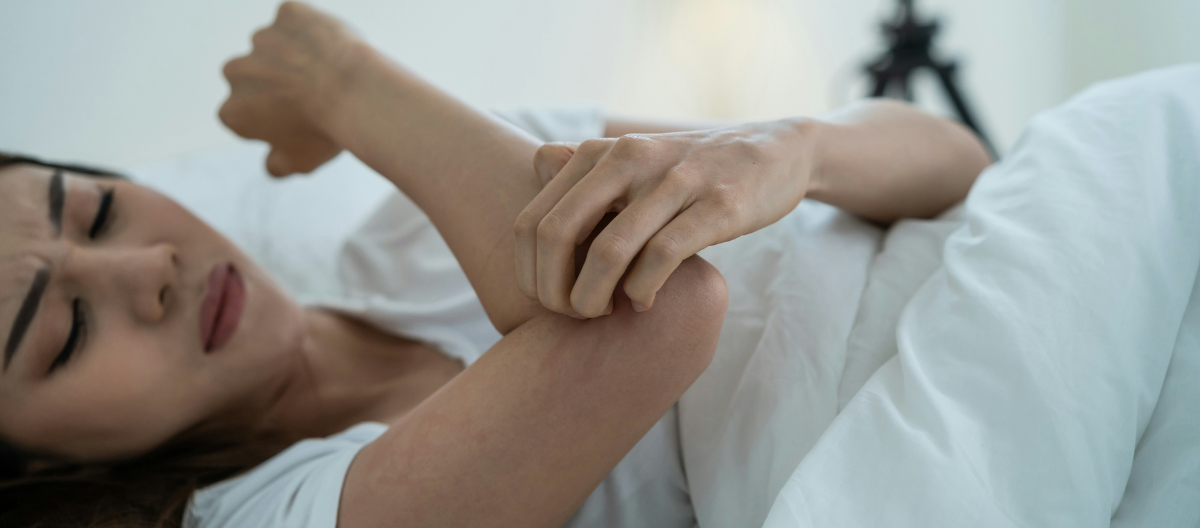Eczema, also known as atopic dermatitis, is a chronic skin condition that causes inflammation, redness, and intense itching. It is a common condition that affects millions of people worldwide, with women experiencing unique challenges due to hormonal fluctuations, lifestyle factors, and skin sensitivity. Understanding the causes, symptoms, and treatment options can help manage and alleviate the discomfort associated with eczema.
Causes of Eczema in Women
Hormonal Changes: Women may experience flare-ups of eczema during periods of hormonal change, such as puberty, pregnancy, menstruation, or menopause. These fluctuations can affect the skin’s barrier function, leading to increased sensitivity and dryness.
Genetics: Eczema often runs in families, indicating a genetic predisposition. If you have a family history of eczema, asthma, or allergies, you may be more likely to develop the condition.
Environmental Triggers: Exposure to environmental factors such as allergens (pollen, dust mites, pet dander), irritants (soaps, detergents, fragrances), and changes in weather can trigger or worsen eczema. Women who use skincare or beauty products that contain harsh chemicals may also be at higher risk.
Stress: Psychological stress is a known trigger for eczema. The body’s response to stress can exacerbate symptoms, making the skin more prone to flare-ups.
Diet and Allergies: Certain foods or allergens may trigger eczema in some women. Common dietary triggers include dairy, gluten, nuts, and eggs. It’s important to identify any specific allergies or intolerances that could be contributing to your condition.
Symptoms of Eczema in Women
Itching: Intense itching is one of the most common and distressing symptoms of eczema. Scratching can lead to further skin irritation, thickening, and even infection.
Red, Inflamed Skin: Eczema often presents as red, swollen patches of skin that may feel warm to the touch. In darker skin tones, these patches may appear darker brown, purple, or ashen gray.
Dryness and Flakiness: The skin may become extremely dry, leading to flakiness and a rough texture. This is due to a compromised skin barrier, which allows moisture to escape more easily.
Crusting and Oozing: In severe cases, eczema can cause the skin to ooze or develop crusty sores, particularly if scratching leads to broken skin.
Thickened Skin: Over time, areas of the skin affected by eczema can become thickened and leathery due to chronic scratching and irritation, a condition known as lichenification.
Location: Eczema can appear anywhere on the body, but it commonly affects the face, neck, hands, elbows, and knees. In women, the condition may also be more prevalent on the breasts or the area around the nipples, especially during breastfeeding.
Treatment Options for Eczema in Women
Moisturizers: Regularly applying emollients or moisturizers helps maintain the skin’s barrier function and prevent dryness. Opt for fragrance-free and hypoallergenic products to avoid irritation.
Topical Steroids: Corticosteroid creams and ointments are commonly prescribed to reduce inflammation and relieve itching during flare-ups. It’s important to use these under medical supervision to avoid potential side effects.
Calcineurin Inhibitors: For women who cannot use steroids, or in sensitive areas like the face, calcineurin inhibitors such as tacrolimus and pimecrolimus can be effective alternatives. These help reduce inflammation and the immune response in the skin.
Antihistamines: Oral antihistamines can help reduce itching and improve sleep, especially during severe flare-ups. Non-sedating options can be used during the day, while sedating antihistamines may be beneficial at night.
Phototherapy: In cases of severe or treatment-resistant eczema, phototherapy (light therapy) may be recommended. This involves exposing the skin to controlled amounts of ultraviolet light, which can reduce inflammation and improve symptoms.
Lifestyle Adjustments: Identifying and avoiding triggers is crucial in managing eczema. This may involve using gentle skincare products, wearing soft, breathable fabrics, and managing stress through relaxation techniques.
Dietary Changes: If certain foods are identified as triggers, eliminating them from your diet can help reduce flare-ups. Consulting with a dietitian or allergist may be beneficial for personalized guidance.
Prescription Medications: In more severe cases, oral or injectable medications such as immunosuppressants or biologics may be prescribed to control the immune system and reduce inflammation.
Managing Eczema Flare-Ups
Daily Skincare Routine: Establish a consistent skincare routine that includes gentle cleansing, regular moisturizing, and the application of any prescribed treatments. Use lukewarm water instead of hot, and avoid harsh soaps or exfoliants.
Avoid Scratching: While itching can be unbearable, scratching only worsens the condition. Keep nails short, wear gloves at night if necessary, and use anti-itch creams or cold compresses to soothe the skin.
Stay Hydrated: Drinking plenty of water helps keep your skin hydrated from the inside out. Hydration is especially important in dry or cold weather when eczema symptoms tend to worsen.
Wear Protective Clothing: Choose soft, breathable fabrics like cotton and avoid wool or synthetic materials that can irritate the skin. During flare-ups, consider wearing loose-fitting clothing to minimize friction.
Manage Stress: Incorporate stress-reducing activities into your daily routine, such as yoga, meditation, or deep breathing exercises. Finding time for relaxation can help prevent stress-related flare-ups.


